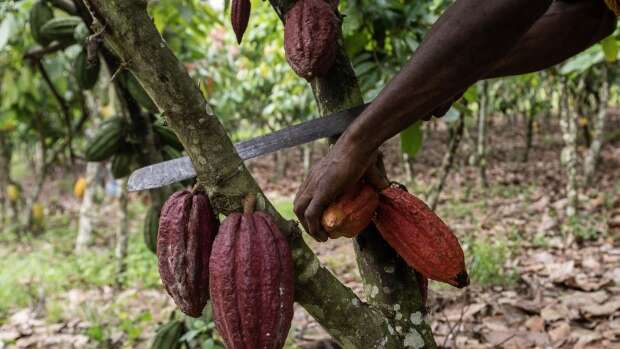Cocoa crisis deepens with Ghana set to lose access to bank loan
Ghana’s funding challenges come as the cocoa harvest for 2023/24 looks set to total about 422,500 to 425,000 tons, half the country’s initial forecast, according to sources familiar with the matter. Without Cocobod payments, farmers won’t be able to afford the seedlings, chemicals and fertilizers that are essential to a healthy crop.
- Advertisement -
Ghana is set to lose access to a key funding facility as a crisis in its cocoa crop has left it without enough beans to secure the funds.
It’s the latest sign of the fallout from the extreme weather and disease that’s hit cocoa output in both Ghana and neighboring Ivory Coast, the biggest grower. Cocoa futures in New York have more than doubled to record levels above $9,000 a ton this year.
- Advertisement -
Now the country is turning to traders to try to plug the funding gap, according to Bank of Ghana Governor Ernest Addison. The Ghana Cocoa Board, the industry regulator known as Cocobod, relies on foreign financing to pay cocoa farmers for their beans.
- Advertisement -
“The second tranche of the cocoa loan is being put together by a consortium of cocoa buyers,” Addison told reporters in Accra on Monday.
Ghana, the world’s No. 2 cocoa producer, secured an $800 million loan at the end of last year from a group of eight banks, led by Cooperatieve Rabobank UA. Cocobod, doesn’t have enough beans to support the second and final $200 million drawdown from the commodity-backed facility, according to people familiar with the matter, who asked not to be identified as the matter is private.
It’s not “prudent” to go for the additional drawdown, said Fiifi Boafo, a spokesman at Cocobod. “Management has decided to avoid an overstretch in the repayment,” he said.
- Advertisement -
Ghana’s funding challenges come as the cocoa harvest for 2023/24 looks set to total about 422,500 to 425,000 tons, half the country’s initial forecast, according to sources familiar with the matter. Without Cocobod payments, farmers won’t be able to afford the seedlings, chemicals and fertilizers that are essential to a healthy crop.
Cocobod, which has previously obtained loans from investors at better rates than the government, would normally conduct an investor roadshow between June and July each year and sign the syndicated facility in September before the new harvest begins in October. Last year, the talks were complicated by the West African nation’s debt restructuring.
As a consequence, it only signed a loan agreement in December and at a record high interest rate of 8%. It was originally scheduled to access the final tranche in January.
Standard Chartered Plc and Societe Generale SA were among the other banks participating in the syndicated loan.
- Advertisement -


